Most dogs will suffer from diarrhea several times in their lives. The majority will recover within a few days, but they’ll likely feel pretty miserable in the interim. Fortunately, there are a few things you may be able to do to help your dog feel better and settle her stomach.
Below, we’ll talk about what you need to help your diarrheal dog, when you need to contact a vet, and some of the best foods you can provide to help put an end to the problem.
Diarrhea in Dogs: Key Takeaways
- Diarrhea is pretty common and most dogs will experience it several times over the course of their lives. Just bear in mind that diarrhea is a symptom of a problem or illness, and it may occasionally signal the presence of a more serious issue.
- While normally not a cause for serious concern, you will need to seek veterinary attention in some cases. This includes times when your dog’s diarrhea lasts longer than it should or if she exhibits any other troubling symptoms.
- You’ll want to do a couple of things when your dog is suffering from diarrhea. For example, you’ll want to give her plenty of chances to poop, ensure she’s drinking water, and withhold food for about 24 hours. Once you resume feeding her, it’s best to start with bland, chicken-and-rice-style meals.
One quick note before we get started: Diarrhea is usually not a big deal; but I will point out several circumstances in which veterinary assistance is required.
If you don’t have a regular vet, or your vet won’t offer help via phone, or you are in any other case where you need some quick-and-easy veterinary advice, you can always reach out to JustAnswer’s Ask a Vet service.
Signs of Dog Diarrhea
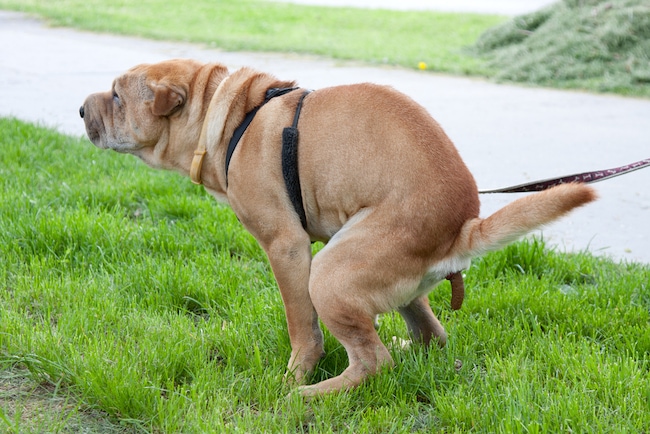
This falls under the heading of, “If you don’t already know, I don’t want to explain it.”
Joking aside, diarrhea is a symptom, not a disease. It is characterized by loose or watery stools, which sometimes occur very frequently. There can also be quite a bit of urgency involved in some cases too.
Blood may or may not be present, and your dog may also exhibit signs of discomfort or mild pain. She may lose her appetite and stop eating, or act mildly depressed or tired too.
Do Dogs Need to Go to the Vet for Diarrhea?
In all likelihood, your dog will suffer from several bouts of diarrhea over the course of her life. In most cases, she’ll recover completely and be no worse for the wear. And, as we’ll get to in a moment, there are a number of things you can give her that may help settle her stomach and cease soft stools.
Understand that diarrhea is one of the body’s ways of protecting itself (just like vomiting). In a way, diarrhea signals that your dog’s body is working the way it is supposed to.
For example, if you give a tiny terrier a double-cheeseburger, the fat content in the burger is likely to overwhelm her digestive system. This will cause her body to take drastic measures, and get rid of everything, to help restore order.
Similarly, if your pet ingests some harmful bacteria, her gastrointestinal tract may go into overdrive to flush (sorry) out the pathogens and any toxins they create.
In an ideal situation, this ends the problem. Your dog poops once or twice, and she begins feeling pretty normal in a day or so.
But the problem is, diarrhea isn’t always effective. Some bacteria are harder to flush out than others, and other bacteria may set up shop in other organ systems or turn into systemic infections. Additionally, bacteria and fatty foods aren’t the only things that can trigger diarrhea.
When Dog Diarrhea Requires Medical Attention
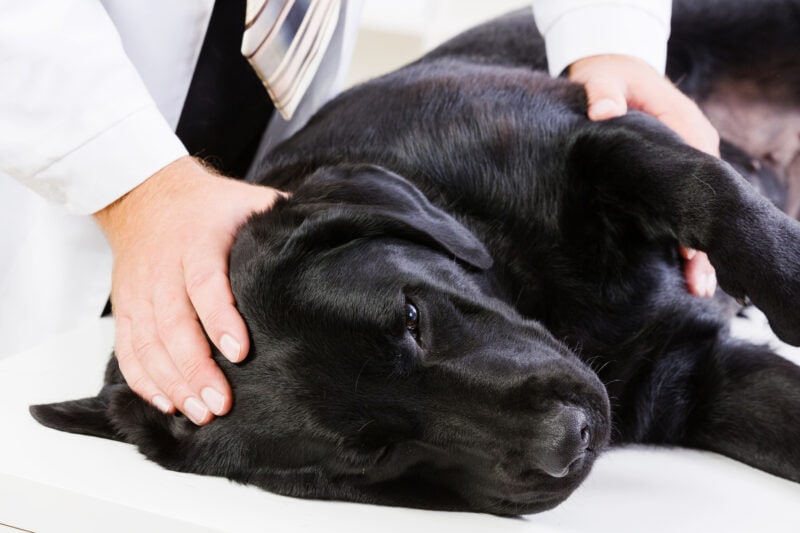
This means that – in some cases – diarrhea does necessitate a trip to the vet. Typically, you should call your vet or drop by for a visit if any of the following are true:
→ The diarrhea lasts longer than 48 hours or so
Different authorities have different rules of thumb in this regard, with some recommending seeking veterinary help in as little as 24 hours, while others only regard it as necessary after three or four days.
→ Your dog does not appear to be drinking
Prolonged diarrhea can cause extreme dehydration, which can become life-threatening in a relatively short period of time. Some dogs drink more water than others, so just try to compare her current level of fluid intake with her typical behavior. Look out for signs of dehydration, including a dry nose, sunken dry-looking eyes, and loss of skin elasticity.
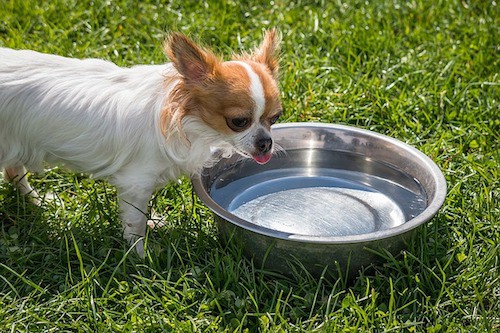
→ Your dog strains without producing much stool
Although it doesn’t always signal a serious problem, straining without expelling much can be a sign of a bowel blockage. These are caused by your dog ingesting something she shouldn’t, such as toys, mulch, or rocks.
Other signs of a bowel obstruction include:
- Vomiting
- Non-productive retching
- Hunched posture
- Abdominal tenderness
- Whining
- Restlessness
Bowel blockages are a veterinary emergency and need prompt care. Report to your nearest emergency vet for treatment if you suspect a blockage.
→ Your dog exhibits any other troubling symptoms
If your dog is also exhibiting any other troubling signs, go ahead and give your vet a call.
Worrying signs accompanying watery diarrhea include:
- Vomiting
- Fever
- Moderate to severe abdominal pain
- Mucus
- Weight loss
- Blood in stool (including not only red streaks of blood but also digested blood, which will make your dog’s stools appear black rather than brown)
- Prolonged lack of appetite
- Unusual drooling
- Anything else that seems unusual or causes you concern
My Dog Has Diarrhea But Acts Fine – What Does That Mean?
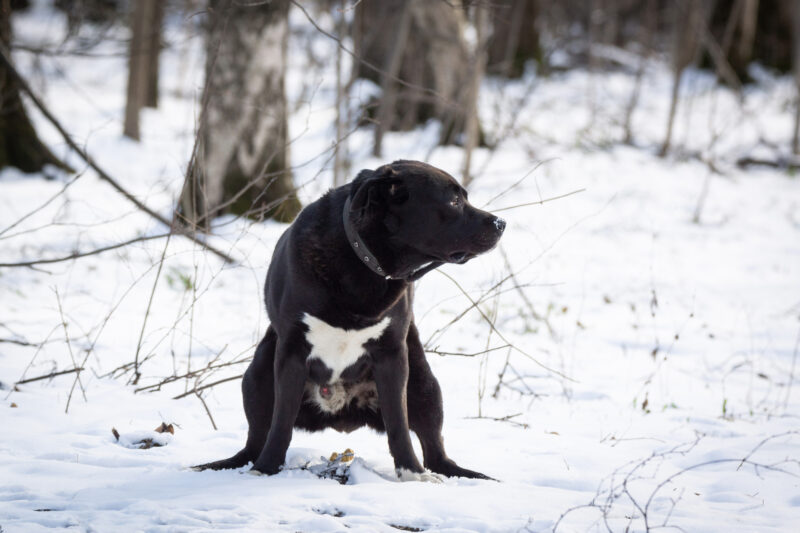
Many dogs will continue to act normally even while they’re experiencing loose stool. While this doesn’t guarantee that your dog isn’t suffering from a serious illness, it is usually a good sign.
You’ll still want to keep a good eye on her and be sure to visit the vet if her condition worsens or she begins displaying any troubling symptoms. You’ll also want to contact your vet if the watery diarrhea lasts for more than a day or two.
But if she seems fine, just follow the advice discussed below to help put an end to the problem.
What Causes Diarrhea in Dogs?
As mentioned above, there are a number of things that can trigger diarrhea in dogs. Some of the most common reasons for diarrhea include:
- Bacterial infections
- Viral infections
- Protozoans (such as amoebas and other single-celled cooties)
- Toxins
- Excessive fat consumption
- Intestinal parasites
- Medications
- Ingesting foreign objects
- Eating spoiled food
Additionally, eating some foods and table scraps can irritate your dog’s gastrointestinal tract and trigger bouts of diarrhea, as can rapid changes in diet (this is why it is always wise to make food changes gradually, over about five to seven days). In other cases, a chronic condition like inflammatory bowel disease can be to blame.
The Poo-Poo Protocol: What To Do When Your Dog Has Diarrhea
You must always take responsibility for your four-footed bestie and make the best decisions you can on her behalf. She depends on you for everything! Never hesitate to contact your vet anytime you think it is appropriate, as pet parents always know their pups best. If your dog is showing serious symptoms, such as bloody diarrhea, head to the nearest emergency animal hospital.
But again, acute diarrhea (short-term) is pretty common, and you can often resolve the issue on your own with simple, effective treatment. This means doing a few things:
1. Give Your Dog Plenty of Pooping Opportunities
If your poor pup has diarrhea, she’ll likely need to poop more than normal. Just make sure that you give her ample opportunities to do her business if she doesn’t have constant-access to a fenced backyard or similar safe place to relieve herself.
Not only is this just the decent thing to do on behalf of your pet, it’ll likely give her the best chance to expel everything and start healing quickly. It’ll also help protect your carpet.
So, make your bathroom breaks longer than normal and pay close attention to your dog so you’ll notice any subtle signs that tell you she needs to visit the facilities.
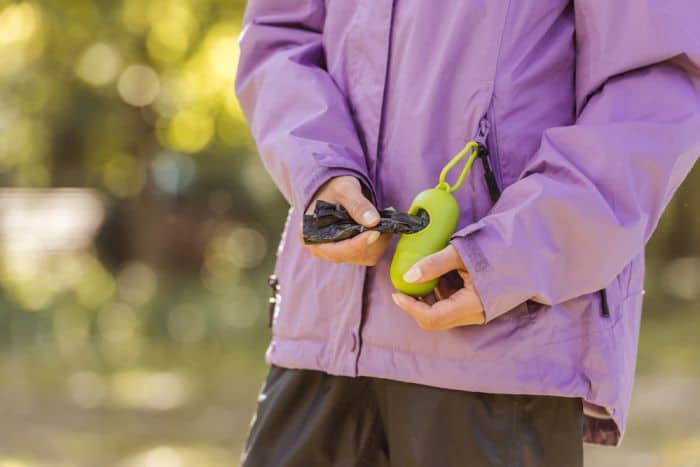
2. Encourage Your Dog to Drink Plenty of Water
Quick biology lesson: Most of the heavy lifting of digestion happens in your dog’s stomach and small intestine. Once the small intestine is through sucking out the vitamins, calories and other assorted good stuff, the resulting material is almost entirely – and I don’t mean to get too technical here — liquid goo.
The large intestine slows the goo down and starts sucking the water back out of it. This results in firm, solid poops.
But when a dog has diarrhea, the large intestines don’t slow the goo down and remove the water. Instead, the large intestines just try to get rid of the liquid-like mixture as quickly as possible.
The amount of liquid lost in the process is pretty significant (especially if episodes of diarrhea occur occurs over an extended period of time), and it often leads to very serious dehydration.
So, the point of all this is, it is imperative that you encourage your dog to drink plenty of clean water when suffering with or recovering from diarrhea.
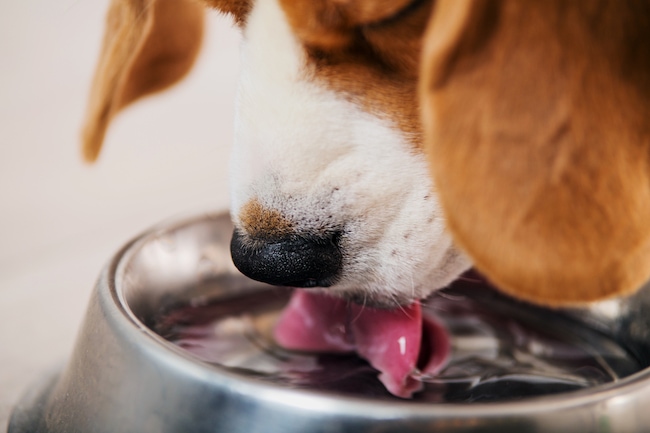
Some easy ways to increase your dog’s fluid intake:
- Feed your pup ice cubes or ice chips, if she’ll have them.
- Opt for a continually-flowing dog water fountain, which keeps water fresher and tends to be more appetizing to dogs.
- Feed her low-sodium broth, which most dogs are eager to lap up!
- Offer low-sodium broth ice cubes as a crunchy, cool treat.
3. Withhold Food for About 24 Hours
Assuming that your dog is an otherwise-healthy adult, it is usually a good idea to withhold food for about 24 hours during an episode of diarrhea. This will help facilitate the purging her body is trying to accomplish, and it’ll avoid exacerbating the problem. It’s usually a good idea to wait to feed her until the diarrhea subsides or you speak to a vet.
Some dogs experience a loss of appetite while suffering from acute diarrhea, so this is no big deal, but others may put on their best puppy dog eyes for a snack. We know it’s hard to resist giving in, but she’ll likely recover faster if you hold off on food.
4. Resume Feeding Slowly
Once it’s been about 24 hours and the diarrhea has subsided, you can begin feeding your dog again.
But you may not want to feed your dog her regular food (more on this in a moment), and, most importantly, you don’t want to feed her too much too fast. Doing so will only exacerbate intestinal distress.
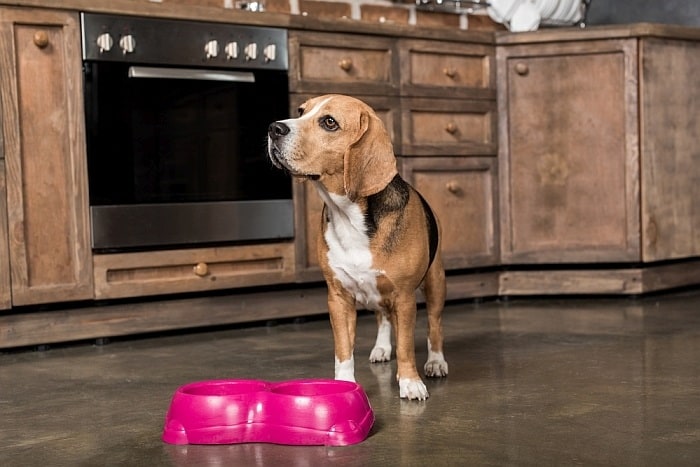
There are no hard-and-fast rules regarding the amount of food to give your dog after an acute bout of diarrhea, but it should be somewhere in the neighborhood of ¼ to ½ as much food as you normally do.
For example, if you normally feed your dog three or four cups of kibble a day, start by giving her about ½ a cup and wait a few hours to see how her body reacts. Then give her another ½ cup and see how her body reacts. You may want to opt for smaller, more frequent meals while your dog recovers.
As long as she’s not pooping or having normal poops, and she’s acting normal otherwise, just continue this process while slowly resuming her normal feeding schedule.
Best Food For Dogs With Diarrhea: Dog Diarrhea Home Remedies
Because you don’t want to irritate your dog’s intestinal tract, it is imperative that you provide her with something she can digest easily after mild bouts of diarrhea. The following things are usually pretty good options.
As we discussed above, it is usually a good idea to withhold food for a while after your dog experiences diarrhea. But once you are prepared to start feeding her again, you may want to consider offering something other than her typical food.
Feed your dog this bland diet until her stools regain a firm consistency and she’s acting normally again.
1. White Rice
White rice is one of the best foods to feed dogs with diarrhea. Rice is quite easy for most dogs to digest, and it’s exceedingly bland, which helps to avoid irritating your dog’s intestines.
White rice is also a “low-residue” food, which is simply a diplomatic way of saying it doesn’t turn into a lot of poop the way some other foods (read: high-fiber foods) do.
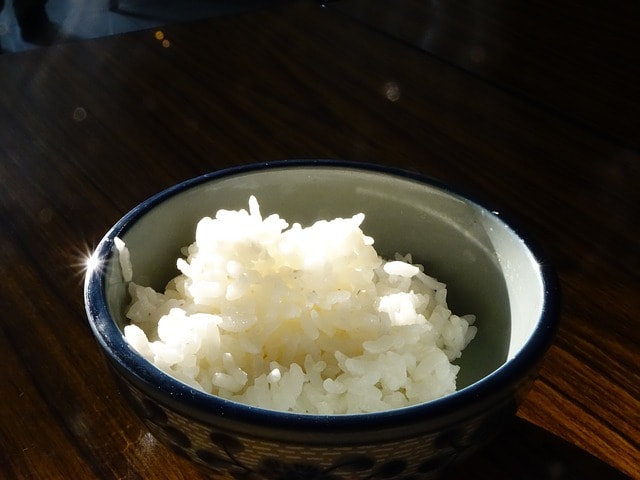
2. Boiled Chicken
If you want to provide some more calories and protein to your pooped-out pup, boiled chicken breast is likely the best option. It’s not only high in protein and low in fat, but most dogs love chicken and digest it pretty easily.
As a bonus, you can use a bit of the resulting stock to flavor your pup’s water, which should encourage her to drink more fluids, warding off dehydration and electrolyte imbalances.
3. Boiled Potatoes
Potatoes can help firm up your dog’s stools, and they’re also pretty easy to digest.
Potatoes aren’t an ideal carbohydrate for all dogs (such as diabetic dogs or those prone to yeast infections), but most healthy adults will tolerate them very well.

Unfortunately for your dog, you’ll need to skip all of the delicious fats or seasonings that often accompany potatoes, including butter or salt. Just serve ‘em plain and cut into bite-sized pieces for your canine companion.
4. Pumpkin Puree
Canned pumpkin puree (or boiled pumpkin or butternut squash) is a great home remedy for your dog’s intestinal issues. It’s basically a silver bullet for treating canine diarrhea. Pumpkin is full of soluble fiber, which helps to absorb some of the fluid your dog’s intestines, as well as insoluble fiber, which provides bulk for your dog’s poop.
Some dogs will eat pumpkin puree directly from a spoon, but others don’t seem particularly fond of the taste. But fortunately, it doesn’t take much pumpkin to have the desired effect. Recommended “dosages” differ, but you’re generally talking about adding a teaspoon or two of pumpkin puree to your dog’s food for little puppers and a few tablespoons for big pups for a couple of days.
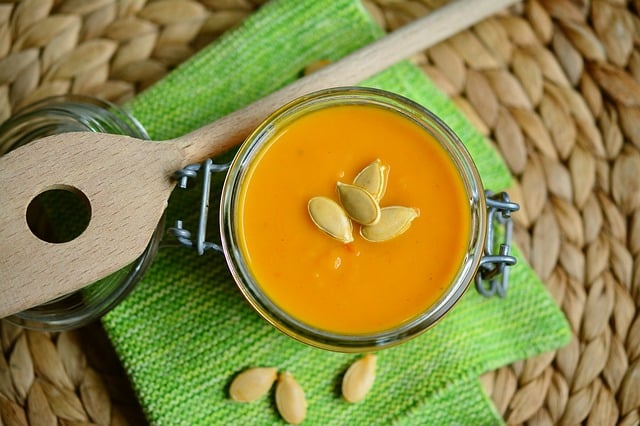
If your dog doesn’t like the taste of pumpkin (mine is definitely not a fan), you can mix it in with one of the other foods recommended above or her normal food. Pumpkin has a pretty strong odor and flavor, so start with a small amount to avoid spooking her.
Always keep a can of pumpkin puree in the pantry. You can usually find it on one of the bottom shelves in the baking section of your local grocery store.
Just be sure that you don’t accidentally confuse pumpkin puree with pumpkin pie filling. They’re often sold side-by-side, and they look pretty similar.
How Long Should I Feed My Dog The Bland Diet?
It’s generally recommended that you keep your dog on a bland diet until your dog shows firm, normal stools (or until you haven’t seen any bowel movement over the course of a day.
A generally recommended bland diet is 1/3 cup chicken with 2/3 cup rice. You could also add a dollop of pumpkin or potatoes too.
Then, you’ll slowly decrease the bland diet and increase your dog’s normal food over a gradual time period. For example, the first day you might just do 25% normal kibble and 75% bland diet. The next day you could do 50/50, and so on.
What Can I Give My Dog For Diarrhea Over the Counter?
You should never give your dog any drug or medication – even over the counter medications – without speaking to your vet first. Having said that, many times, vets often (but not always) recommend administering one of two most common OTC medications for a single episode of diarrhea. We’ll discuss both below, along with a third canine-specific diarrhea remedy.
Pepto Bismol
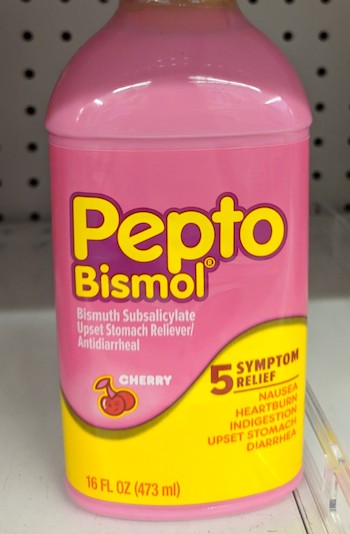
We’ve discussed giving Pepto Bismol to dogs in depth before, but we’ll break down the basics here.
Pepto Bismol is used by people to treat a variety of intestinal and stomach-related ailments, including diarrhea. The active ingredient in Pepto Bismol is a substance called bismuth subsalicylate.
Despite the fact that it is very effective for treating digestive discomfort, scientists still don’t understand exactly how bismuth subsalicylate works. They suspect that it stimulates the intestines to absorb fluids, kills off some types of bacteria, and binds with some of the toxins produced by E. coli and other bacterial strains, but a lot of these things have yet to be conclusively demonstrated.
Pepto Bismol can be helpful for treating diarrhea in dogs, but you shouldn’t administer it without first consulting your vet. Most dogs can safely consume Pepto Bismol, but it can mask internal bleeding, cause problems with X-rays, and lead to other problems with long-term use.
Imodium
Like Pepto Bismol, we’ve discussed whether or not you can give your dog Imodium before, so be sure to check out our complete discussion of the subject.
Imodium is a synthetic opioid that was originally developed to be a pain killer. Unfortunately, it turned out to be pretty ineffective for treating pain. However, like most other opioids, it slows down the digestive tract and often causes constipation. Accordingly, humans now use it to treat diarrhea.
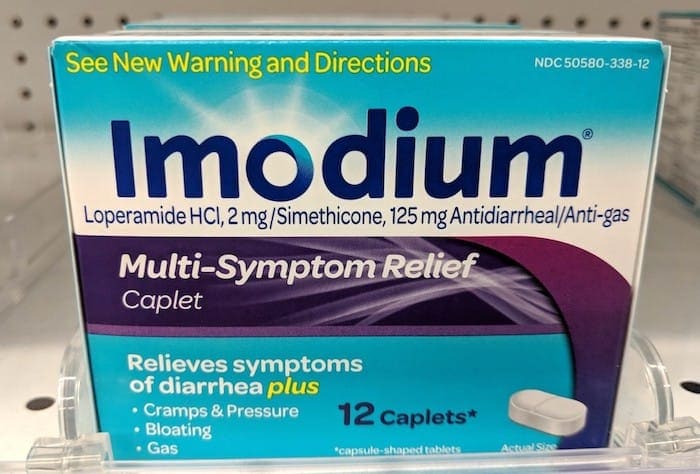
It also works in dogs, but it is unfortunately not safe for many canines. Some herding breeds, as well as dogs suffering from a variety of medical conditions, are especially at risk and should not take Imodium. This is part of the reason it is imperative that you speak with a veterinarian before administering this medicine to your pooch.
Vets Preferred Advanced Anti-Diarrhea
Unlike Pepto Bismol and Imodium, Vets Preferred Advanced Anti-Diarrhea is made specifically for dogs.
This liquid-form anti-diarrheal provides quick relief from diarrhea caused by dietary indiscretion, food intolerance, or other everyday triggers with the active ingredients pectin fiber and kaolin clay. These work together to form firmer stools and soothe the digestive tract, relieving canine diarrhea. Both ingredients are known to absorb water in the digestive tract (bulking stools), while kaolin clay is also thought to bind with some toxins.
The liquid formula is easy to administer to your dog via a liquid syringe or by mixing it over bland food like rice.
While this canine-friendly formula is likely OK for most dogs experiencing an occasional bout of diarrhea, it’s always best to check with your vet before trying a new dog supplement, just to ensure it won’t interact with any of her existing health issues or medications.
Treating Diarrhea in Dogs: FAQ
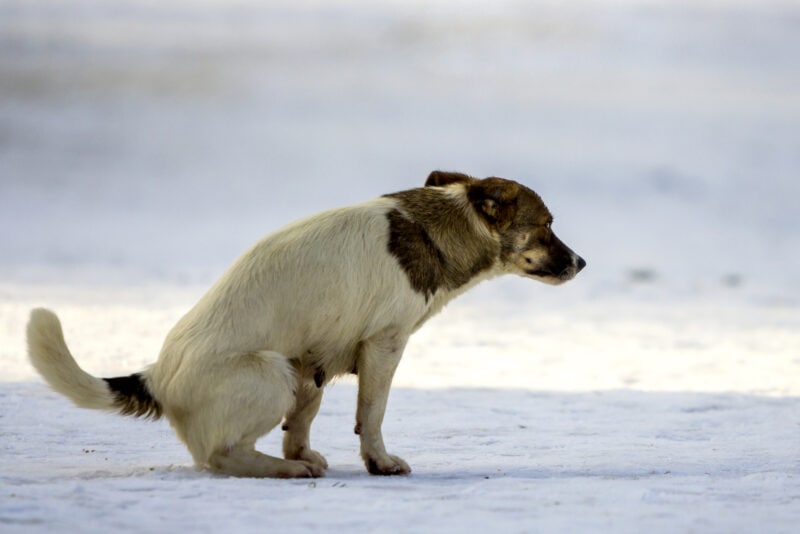
Diarrhea is a complex canine conundrum, so don’t feel bad if you still have questions. Check out these commonly asked questions and answers that can help.
When should I be concerned about my dog’s diarrhea?
Dogs with diarrhea who strain without producing much stool need to be seen promptly by your vet to rule out a bowel blockage. Your dog should also see the vet immediately if her diarrhea is accompanied by any severe symptoms, including blood in the stool, vomiting, and obvious pain.
A vet should also treat diarrhea that lasts longer than 48 hours. This is usually a sign something more serious is going on than a simple food intolerance or upset stomach. Chronic diarrhea is another concern your vet should investigate. Diarrhea that occurs more often than once in a blue moon without an apparent cause (such as after eating fatty foods) should receive a nose-to-tail checkup to rule out underlying conditions like a food allergy or intestinal disease.
Keep in mind that puppies, seniors, and medically fragile dogs are at-risk during any bout of diarrhea, regardless of the duration. Fluid loss can be especially dangerous to dogs with kidney disease or other serious illnesses.
What can I give my dog to stop diarrhea?
Dogs with diarrhea often see a resolution of symptoms after the irritant flushes through their system in their stool. You may also administer one of the three over-the-counter medications discussed above, provided that your vet gives you the green light to do so.
Just be sure that you provide your dog access to clean, cool water and withhold food for about 24 hours. After this window, you can offer a bland diet of boiled chicken and rice until gradually weaning her back onto her regular kibble. This gives her system a chance to recover.
When is dog diarrhea an emergency?
Diarrhea causes a loss of fluids which can quickly become dangerous for small, young, and older dogs. Watch these canines closely for signs of dehydration, including a loss of skin elasticity, lethargy, and sunken eyes. If you notice these, get your dog to the vet.
A vet should immediately see dogs with diarrhea who strain to potty without producing much to rule out a dangerous blockage. Dogs with serious symptoms like bloody stools, noticeable pain, and lethargy should also visit an emergency vet, along with those suffering from prolonged or severe diarrhea.
What caused my dog’s diarrhea?
Unfortunately, a lot of things can cause diarrhea in dogs. Food intolerance is a common issue, along with viral and bacterial infections. Your dog could also have a food allergy or even a painful blockage somewhere in the digestive tract. Diarrhea may be stress-induced as well, as some dogs experience diarrhea when anxious. This phenomenon is somewhat common in canines staying in commercial kennels.
The answer to what exactly caused your diarrhea isn’t always immediately obvious, but think back to your dog’s most recent activities and whereabouts. Did she get in the trash? Eat rabbit droppings? Recently change foods? From there, you can usually work out a possible explanation and work on a solution.
Chronic diarrhea is a different story and requires your vet’s help to exclude health issues, including pancreatitis, liver disease, and more. If a food allergy or intolerance is suspected, your vet may recommend an elimination diet to determine your dog’s triggers.
How long does dog diarrhea last?
Canine diarrhea is usually short-lived, resolving itself within 24 to 48 hours with basic treatments like temporary pausing meals or offering bland food. Provide plenty of fresh water and potty breaks during this time, and always keep an eye on what your dog’s stool looks like, regardless of how unpleasant the task is. This allows you to spot signs of trouble, like blood.
Diarrhea that lasts more than 48 hours requires a vet visit, as do frequent bouts of loose stool. Chronic diarrhea isn’t anything to play around with, and a vet should examine your dog for an accurate diagnosis. Persistent diarrhea over a period of time could mean your dog is experiencing anything from a food allergy to gastrointestinal disease or other health conditions.
Can I prevent diarrhea?
You can’t always prevent diarrhea, but you can take steps to protect your pup’s guts against trouble. Always walk your four-footer on a leash in unfamiliar areas to prevent her from ingesting any foreign bodies or stool. Never offer her fatty foods or human scraps that may be rich in oils, salts, sugars, or dairy. You should also secure trash cans and only offer dog-safe chews, treats, and supplements.
Switching foods requires special care, too, as changing your dog’s diet too fast can lead to diarrhea. Follow the food’s recommendations, with most advising a slow transition over time in which you gradually replace your dog’s existing food with the new variety over a 10-day period. This gives your gobbler’s guts a chance to adjust, preventing gastric upset.
Another potential way to prevent pupper diarrhea is to
introduce probiotics to your dog’s diet. These beneficial bacteria help balance out your canine’s gut flora, stopping bacterial overgrowth and imbalances that can sometimes lead to diarrhea and aiding your dog’s stomach and intestinal health.
Can I give my dog Pepto for diarrhea?
Pepto is one of the few human medications that can be used in dogs but always check with your vet before administering it to be sure it’s the right option for your canine. It can hide telling signs of trouble, such as blood in the stool, and it can make X-rays less reliable.
Most dogs with diarrhea see a positive response to treatment that doesn’t include the use of over-the-counter medications, including withholding food for 24 hours, resting, and drinking water. Afterward, offer bland food before reintroducing your dog’s regular diet over a gradual time period.
Can I give my dog Imodium for diarrhea?
Imodium can be used in some cases to treat dogs with diarrhea, but as with Pepto Bismol, you should verify this with your vet before offering it to your pup. It isn’t safe for many herding breeds and dogs with some medical conditions.
Can I give my dog cottage cheese for diarrhea?
Cottage cheese is sometimes recommended for acute diarrhea, but check with your vet first, as dairy products can cause digestive upset in dogs. The fat content in cottage cheese can be an issue for breeds prone to pancreatitis, and lactose-intolerant dogs will experience worsening symptoms. This is also why a probiotic is preferred over natural yogurt for beneficial bacteria.
***
Diarrhea is a very common health issue, and virtually every dog will experience it a few times during their lives.
Just be sure to follow the advice recommended above and don’t hesitate to contact your vet if the problem persists or is accompanied by other symptoms.
Do you have any helpful tips for treating diarrhea in dogs? We’d love to hear about them. Let us know what you do to help settle your dog’s stomach in the comments below!
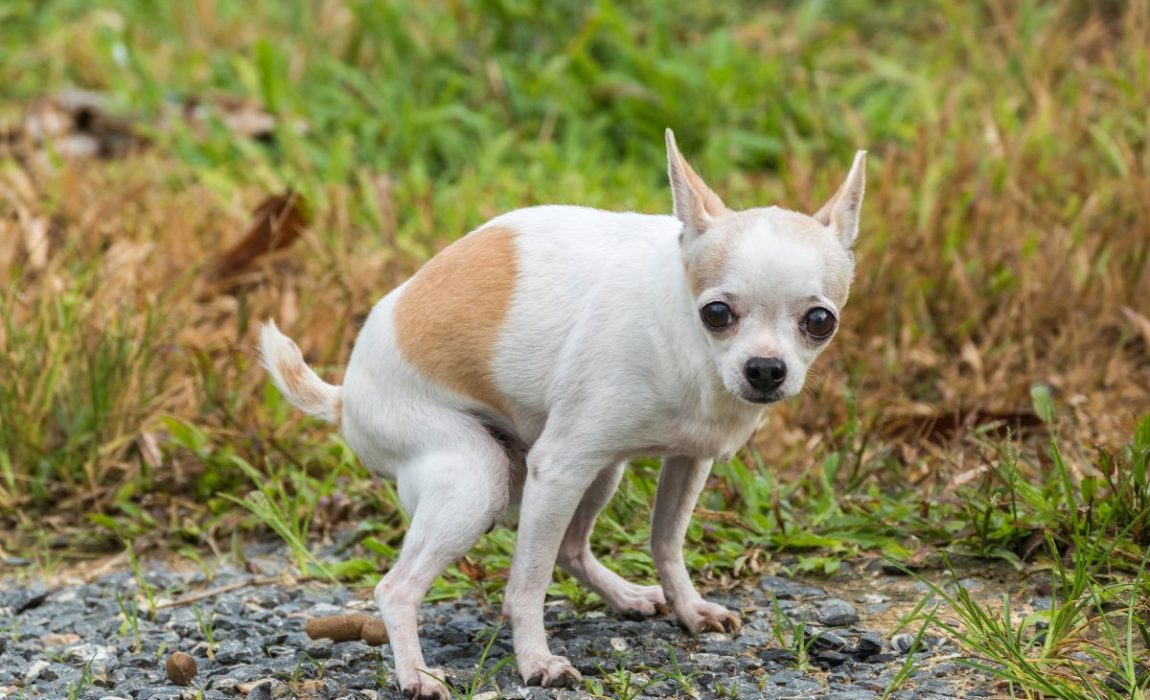

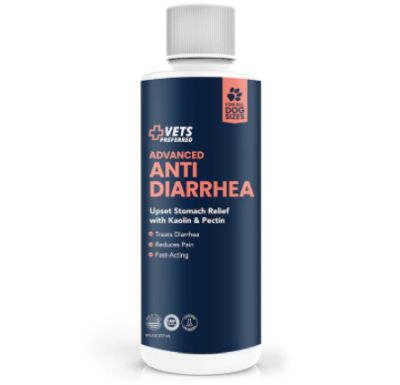




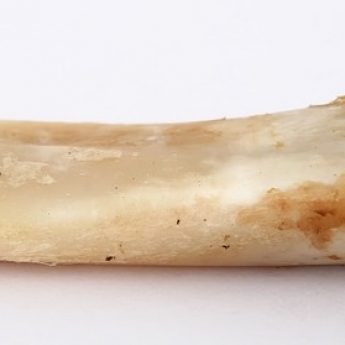
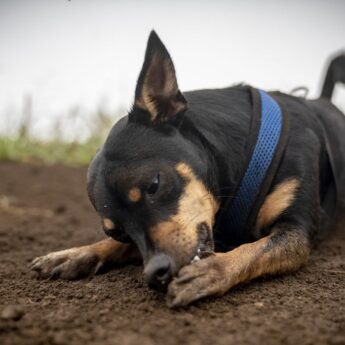
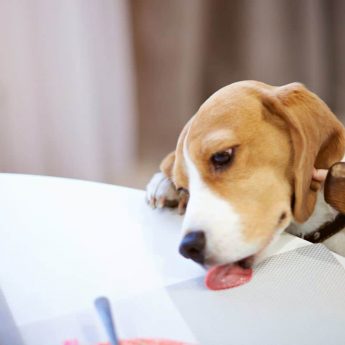
6 Comments
July 30, 2021
Great article and unfortunately for me and my Maggie, very timely 🙁
August 2, 2021
Glad you found it helpful, LauraJay! Best of luck!
June 30, 2021
Thank you for a most informative article on Diarrhea in Dogs.
June 30, 2021
Glad you found it helpful, Jeremy!
November 26, 2020
I have found low-fat, small curd cottage cheese helps her recover. It appears easy on her stomach, she loves it, it also sneaks in some extra moisture into her diet. Since it’s dairy, checking first with your vet as usual is important.
Also, my Labrador Retriever will get a teaspoon of PLAIN yogurt which seems to help.
November 30, 2020
Well said on both counts (checking with your vet first and opting for plain yogurt), Mary.
Glad you’ve found something that works for your pooch!